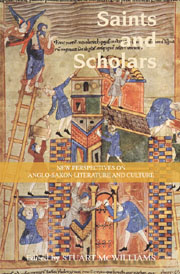 Saints and Scholars
Saints and Scholars Book contents
- Frontmatter
- Contents
- List of Contributors
- Abbreviations
- Introduction
- I Hagiography and the Homiletic Tradition
- II Aspects of Community and Consumption
- 8 Stories from the Court of King Alfred
- 9 De Duodecim Abusiuis, Lordship and Kingship in Anglo-Saxon England
- 10 Reluctant Appetites: Anglo-Saxon Attitudes towards Fasting
- 11 A Note on the Function of the Inscribed Strip from the Staffordshire Hoard
- 12 The Shining of the Sun in the Twelve Nights of Christmas
- 13 Sin and Laughter in Late Anglo-Saxon England: The Case of Old English (h)leahtor
- 14 Marginal Activity? Post-Conquest Old English Readers and their Notes
- III Reflections on Old English Scholarship
- Poems
- Hugh Magennis: A Bibliography, 1981–2011
- Index
- Tabula Gratulatoria
9 - De Duodecim Abusiuis, Lordship and Kingship in Anglo-Saxon England
from II - Aspects of Community and Consumption
Published online by Cambridge University Press: 05 February 2013
- Frontmatter
- Contents
- List of Contributors
- Abbreviations
- Introduction
- I Hagiography and the Homiletic Tradition
- II Aspects of Community and Consumption
- 8 Stories from the Court of King Alfred
- 9 De Duodecim Abusiuis, Lordship and Kingship in Anglo-Saxon England
- 10 Reluctant Appetites: Anglo-Saxon Attitudes towards Fasting
- 11 A Note on the Function of the Inscribed Strip from the Staffordshire Hoard
- 12 The Shining of the Sun in the Twelve Nights of Christmas
- 13 Sin and Laughter in Late Anglo-Saxon England: The Case of Old English (h)leahtor
- 14 Marginal Activity? Post-Conquest Old English Readers and their Notes
- III Reflections on Old English Scholarship
- Poems
- Hugh Magennis: A Bibliography, 1981–2011
- Index
- Tabula Gratulatoria
Summary
De Duodecim Abusiuis, a Latin text written in Ireland in the seventh century, enumerates and describes what its author saw as the twelve abuses by which the whole of humanity is deceived and iustitia is suffocated; this text, in particular its ninth abuse, was, as Patrick Wormald has said, ‘one of the most profoundly influential formulations of Christian political obligation in the entire Middle Ages’. In England, as on the Continent, the ninth abuse, the unjust king, provided a succession of authors with a means of talking about and to kings and it was one of the cornerstones of the Church's project of forming and reforming kings in ways which served the interests of the Church. The sixth abuse, the dominus sine uirtute, while not as widely used, was also an important formulation of the duties of a particular type of lordship. It is these two abuses that I discuss here, examining how English authors drew on and adapted them from the eighth to the early eleventh centuries.
De Duodecim Abusiuis was an enormously popular text; Aidan Breen, whose unpublished edition in a 1988 Trinity College doctoral thesis supersedes Hellman's edition of 1909 (the standard edition in print), has counted over four hundred manuscripts, the earliest dating from the ninth century, and believes that the total extant number may be much greater. There are two principal recensions, going under the name of Augustine and Cyprian respectively, of which the Augustinian recension is superior.
- Type
- Chapter
- Information
- Saints and ScholarsNew Perspectives on Anglo-Saxon Literature and Culture in Honour of Hugh Magennis, pp. 141 - 163Publisher: Boydell & BrewerPrint publication year: 2012


